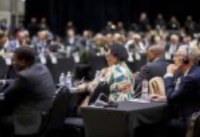IRR declines National Convention invitation, says Parliament reflects “will of the people”
The Institute of Race Relations (IRR) has declined an invitation to participate in the First National Convention of the National Dialogue, pointing out that in a constitutional democracy, Parliament and elections are the “established and legitimate forums” for reflecting the will of the people and holding government to account.
“We do not believe the National Dialogue to be an appropriate or effective way of deciding on government policy.”
In a letter sent to the organisers yesterday, IRR CEO Dr John Endres expresses the IRR’s appreciation for “the courtesy of your invitation”, but says the Institute was compelled to decline on several grounds.
“In a constitutional democracy, there are established and legitimate forums for such work: Parliament and elections. These institutions are mandated to reflect the will of the people and to hold government accountable.
“Furthermore, the true national dialogue takes place every single day, in South African streets, in the shops, in newspapers, on call-in shows, and in the everyday interactions between ordinary South Africans as they exercise their constitutional right to free expression and the free exchange of ideas. Against this backdrop, a staged National Dialogue is a costly distraction.”
Endres notes that “(t)here is already abundant research, including our own, describing the formidable consensus of ordinary South Africans regarding their priorities.
“Consistently, these are: jobs (and the economic growth that produces jobs), safety of life and property, and functional government services. These findings have been clear for years. It is not necessary to spend hundreds of millions of rands to reconfirm them through laborious and inefficient gatherings that can involve only a tiny fraction of the population.
“If the National Dialogue were conducted in good faith, it would inevitably reveal widespread and well-known failings of government in general and the ANC in particular. We therefore doubt that it will be undertaken in good faith. Our assessment is that the Dialogue is designed primarily to elevate the ANC’s stature ahead of the local government elections and to manufacture the appearance of broad public endorsement for core ANC policies, such as the National Democratic Revolution (NDR).”
Endres points out: “It is precisely the NDR and its attendant policies that have created many of the outcomes most South Africans find unacceptable: a stagnant economy, rising unemployment, worsening crime, and deteriorating government services. Addressing these problems requires a decisive departure from the NDR. We see no indication that the ANC is prepared to consider such a change.
“The ANC and other participants in the National Dialogue are welcome to engage with our research and proposals, and we remain available for direct consultations at any time.
“However, in the absence of the foundational conditions for success and the political will to confront the real causes of our challenges, we do not believe our participation in the Convention would serve a constructive purpose.”
Endres concludes by reiterating the IRR’s “willingness to meet bilaterally to discuss practical policy solutions”.


